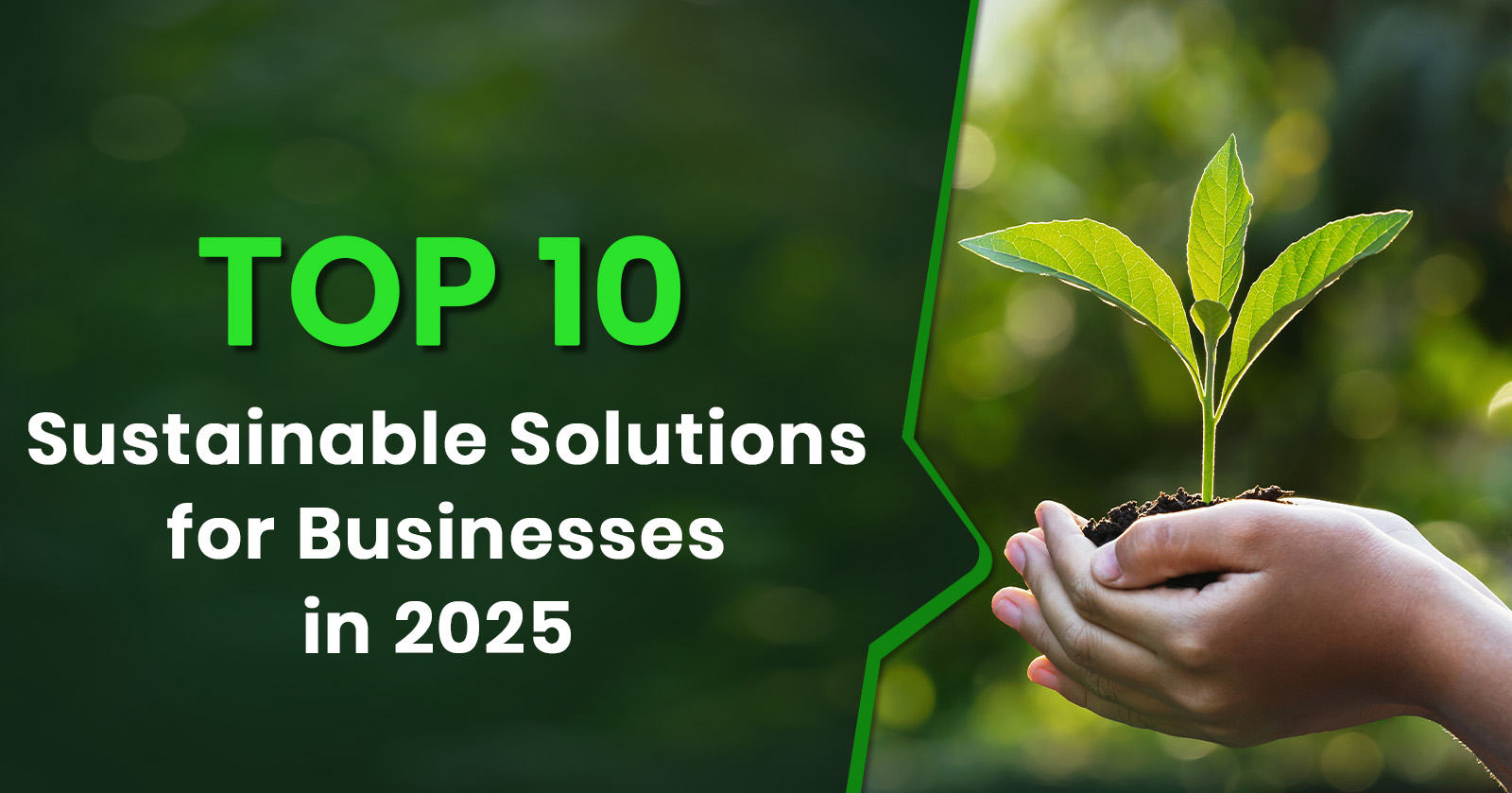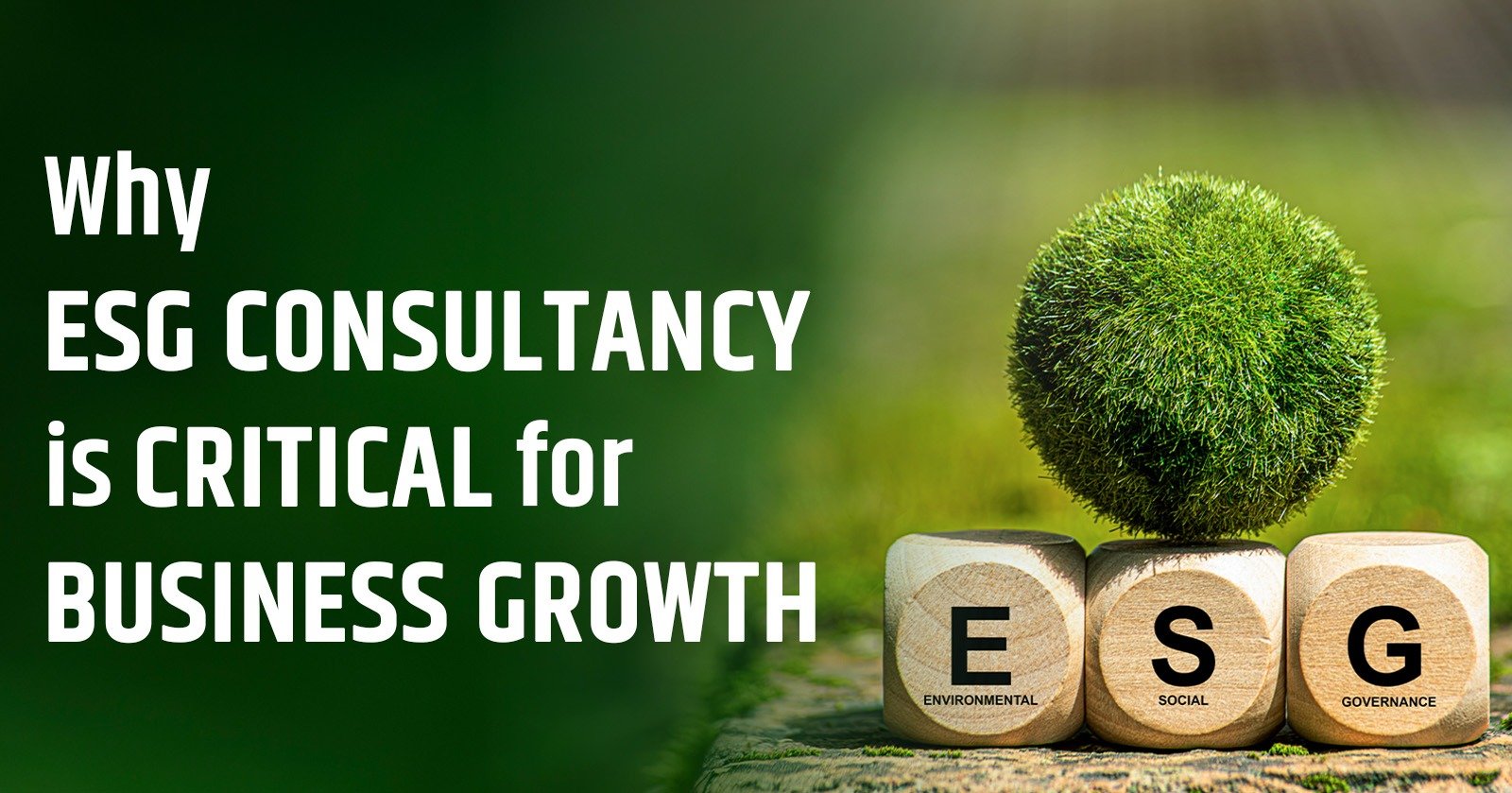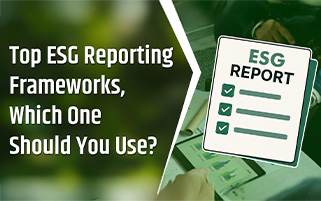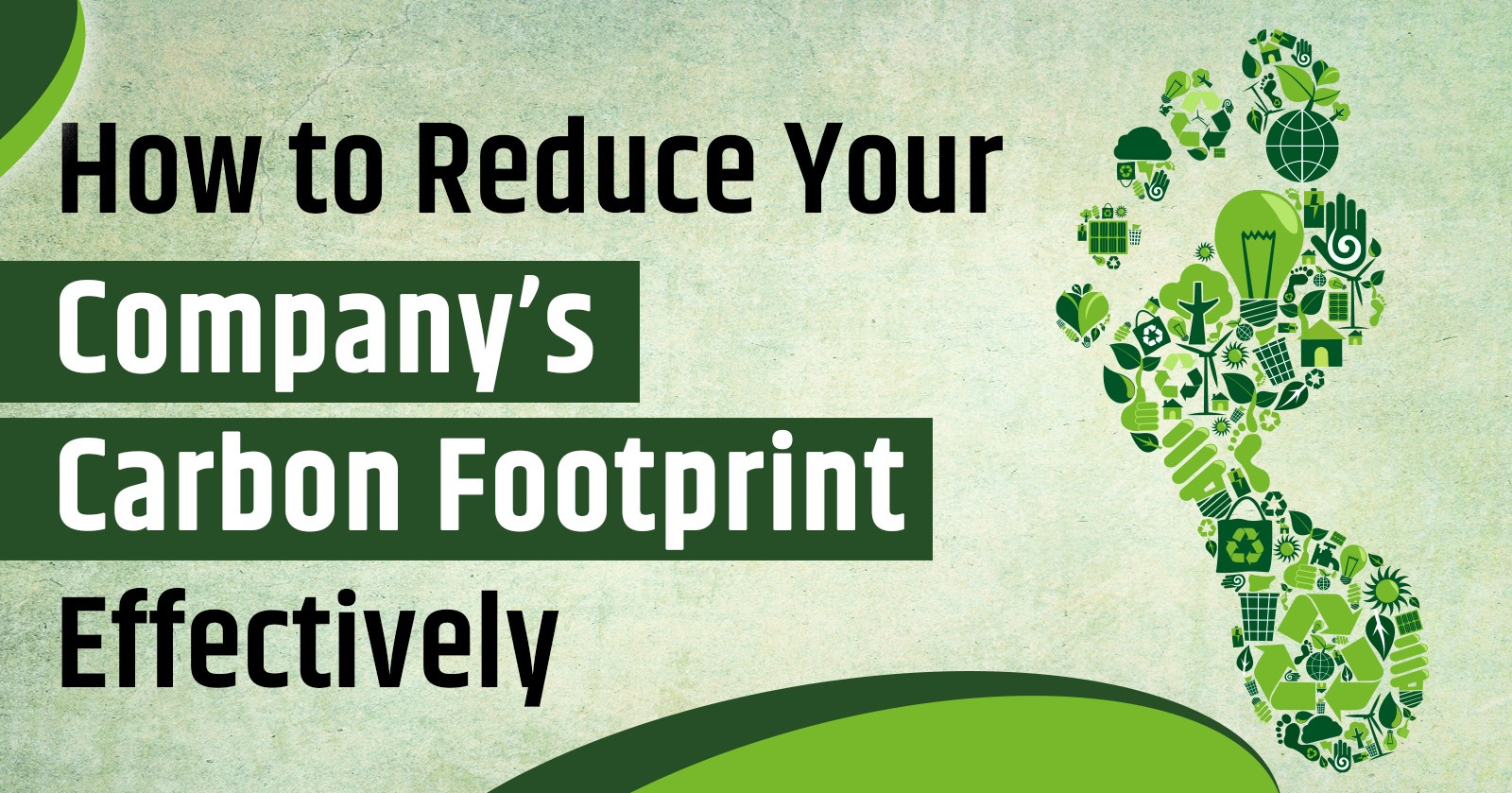Top 10 Sustainable Solutions for Businesses in 2025.

As we move forward into 2025, the concept of sustainability is no longer just for show; it has become imperative for both established businesses and growing businesses. According to government orders, it has become necessary for the top 1,000 listed companies to adopt green business practices, as regulators, investors, and eco-conscious consumers require them to do so. Now, with rising pressure, companies across sectors are reevaluating their operations. The good news? Sustainable Solutions help the Earth become a better place to live, but they also provide tangible financial benefits and reputational advantages.
We’ll be exploring the Top 10 sustainable solutions that every business with a forward-thinking mindset should adopt in 2025. To stay competitive, compliant, and committed to a greener & eco-friendly future. We will also walk through how companies are transitioning from a clean energy approach to circular economy practices by reducing their carbon footprint through the use of eco-friendly strategies, while driving long-term growth.
What are the Key Pillars of Corporate Sustainability?
There are three key pillars of Corporate Sustainability, they are as follows:
- Environment (E): Waste Management, resource efficiency, emissions reduction.
- Social (S): Focuses on Employee welfare, Community Impact, Diversity and Inclusion.
- Governance (G): Ethical practices, Compliance, and Transparency.
What are the Top 10 solutions?
The top 10 sustainable solutions to curb the carbon footprint & emissions of businesses are as follows:
Solution 1: Renewable Energy Adoption, such as Solar energy, Wind energy & Biomass. As everyone knows, clean energy reduces the dependence on fossil fuels, reduces emissions, and lowers energy bills. The best way to adopt this Sustainable solution is by installing rooftop solar panels and entering into Power Purchase Agreements with sustainable solution providers, as well as adopting waste-to-energy solutions, such as biogas, primarily in the agriculture, food, and pharma sectors.Given the current situation, with falling costs and increasing regulatory incentives, renewable energy is now a default sustainable solution option.
Solution 2: To adopt the circular economy practices, such as reusing things, refurbishing them & lastly recycling the materials, enables the companies to minimise the waste, extend the products’ life cycles, and reduce the dependency on finite resources.
Solution 3: After receiving orders from the Government, organisations are busy setting ambitious carbon neutrality goals by actively reducing emissions, investing in clean energy projects, and using verified carbon offset mechanisms to balance out their environmental impact.
Solution 4: There are various waste reduction strategies, such as comprehensive recycling programs, composting initiatives, and reducing plastic usage. Organisations are embedding waste reduction strategies into their daily operations to drive sustainable solutions.
Solution 5: The Green Technology Integration involves the use of innovative technologies, such as energy analytics, AI-powered supply chain optimization, and IoT-based water monitoring. This helps the Organization improve operational efficiency while reducing environmental impact.
Solution 6: Biodiversity Conservation Safeguards ecosystems, organizations supporting the idea of habitat preservation, promote sustainable land use, and also integrate biodiversity-conscious green business practices into their environmental eco-friendly strategies.
Solution 7: One of the Sustainable Solutions is Climate-Smart Agriculture. Sustainable farming methods, including precision agriculture, regenerative soil management, and water-efficient irrigation, are promoted to enhance resilience and mitigate the climate impact on food production.
Solution 8: A widespread, sustainable solution that every organisation should adopt is Water Conservation Measures. Today, organisations have begun to prioritise water stewardship by implementing water-saving technologies, leak detection systems, and reusing treated water to ensure the efficient and responsible use of water.
Solution 9: There is another sustainable solution known as Green Finance Solutions, where companies with a good credit score can apply for ESG-linked loans, green bonds, and investment funds for their ESG projects as CSR (Corporate Social Responsibility) activity, which supports long-term corporate sustainability goals of the Organisation.
Solution 10: EV vehicles are becoming a trend currently. The societal shift from CNG-run vehicles to EV vehicles is accelerating towards a low-emission & carbon footprint-free future. Organisations are upgrading their fleets and investing in electric vehicles (EVs) to achieve a sustainable, green future.
There are many more sustainable solutions that different companies in other sectors can adopt according to their preferences, which benefits both the organisations’ goodwill and society.
What are the benefits for profitability and branding?
Every company has it’s advantages for profitability & branding and we will be listing it below:
Benefits of Profitability in ESG
1. By utilising efficient technologies, energy and water bills can be reduced. Additionally, lower waste management and raw material costs can be achieved through the reuse and recycling of materials.
2. The organisations become eligible for Green finance and sustainable-focused investments.
3. The operational activities become streamlined through resource optimisation and automation.
4. Due to Regulatory Compliance, the organisation avoids fines, penalties, and taxes imposed on it.
5. With the risk mitigation, there is lower exposure to supply chain disruption, resource scarcity, and goodwill damage.
6. After applying the Sustainable Solutions, new market opportunities are opened where organisations provide eco-friendly products & services at market-friendly prices. This also attracts consumers and partners who are sustainability-focused.
Benefits of Branding in ESG
1. Through ESG Branding, a company’s reputation is enhanced in a responsible and forward-thinking way; these types of companies become more appealing to environmentally conscious consumers and investors.
2. Now, customer loyalty and preference come to the forefront. The consumers mostly prefer brands that reflect their values. Their sustainable solutions become a unique selling point (USP).
3. ESG-aligned companies are generally lower risk and more future-oriented. The investor has confidence and trust in these companies since they have a positive perception in terms of valuation and capital access.
4. Young and skilled professionals are attracted to the Sustainable solutions opportunities to work with mission-driven companies. This further boosts employees’ morale and fosters a healthy sense of work satisfaction.
5. Companies adopting Sustainable solutions practices have excellent visibility in the market through awards, features, and CSR stories. They have numerous opportunities to collaborate with governments, NGOs, and global clients.
Green Business Practices is a growth eco-friendly strategies. It reduces operational costs, manages risks, opens new market opportunities, and strengthens your brand’s value in the long term.
Role of ESG consultancy in solution design?
Now, people are more aware of this sustainable solution, commonly referred to as ESG practices. The role of ESG consultancy in providing or designing solutions for companies that want to start their ESG journey they help them with it. They provide support that benefits these companies in the long term.
Although, to began with the solution we need to start with the evaluation, esg reporting is the first step of evaluation of the companies, esg parameters and consultancies helps in providing or filling the gaps in the ESG parameters the one part of this gap in environment field is providing sustainable and efficient solutions.
1. ESG Assessment
- What they do: They anaylse a company’s current operations, the value chain, and environmental & social impact.
- Why it matters: It helps to identify the material ESG risks & opportunities specific to the green business practices.
2. ESG Roadmap Development:
- What they do: They develop custom eco-friendly strategies to meet ESG goals. For eg. net zero, zero waste, water neutrality and energy efficiency.)
- Why it matters: It ensures that the solutions are actionable, measurable, and aligned with global frameworks and compliances such as GRI & BRSR.
3. Prioritization & Feasibility Solutions
- What they do: They help companies to choose the most cost-effective & impactful solutionscsuch as solar energy, water recycling, and green supply chains.
- Why it matters: It avoids Greenwashing & ensures investment in solutions that bring the Return On Investment (ROI) and Impact.
4. Integration of Compliance & Reporting Standards
- What they do: They embed regulatory and voluntary ESG reporting requirements such as BRSR, SEBI & CDP)
- Why it matters: It ensures that implemented solutions not only perform well but also fulfil the disclosure and compliance obligations.
5. The Stakeholder Engagement & Materiality Mapping
- What they do: They identify and engage the key stakeholders such as customers, investors, employees, regulators, to make them understand ESG priorities.
- Why it matters: They provide solution design more inclusive, relevant, and credible.
6. Innovation Advisory & Tech
- What they do: They recommend innovative tools e.g IoT, blockchain & LCA software where they enhance tracking, efficiency, and transparency.
- Why it matters: This ensure the solutions provided are future-ready & data-driven.
7. Risk Mitigation Planning
- What they do: They assess and plan out the ESG eco-friendly strategies for the related risks like climate disruption, resource scarcity, or social unrest.
- Why it matters: It makes the solutions more resilient & adaptable in a volatile environment.
8. Implementation Support & Capacity Building
- What they do: They provide the technical support, training, and change management tools during the rollout of ESG initiatives.
- Why it matters: It ensures a long-term adoption and cultural alignment within the organisation.
9. The Impact of Measurement & KPIs
- What they do: They define success metrics such as, emission reductions, water savings, social impact scores.
- Why it matters: They help business track progress, improving solutions, and report performance.
10. Brand and Communication Alignment
- What they do: They align sustainability solutions with the brands positioning and develop communication strategies.
- Why it matters: It ensures the company communicates it’s ESG journey in an authentic and effective way.
ESG consultancies are not just advisors; they are strategic partners in designing, implementing, and scaling sustainable business solutions. Their involvement ensures the solutions are practical, compliant, data-backed, and aligned with both corporate sustainablity business goals and global sustainability standards.
Who needs sustainability consulting services?
In the starting every Company’s should take advices from the experts but eventually the sectors that actually are in need for the Sustainability consulting services are listed below:
- Organisation seeking for ESG Compliance
- Manufacturers looking to reduce carbon emissions
- Real Estate developers interested in green buildings
- Investors evaluating ESG risks
- SMEs looking for corporate sustainability growth
What should Companies look for when hiring a Sustainability Consultant?
The Companies that starting there ESG journey should keep these pointers in mind while hiring a Sustainability Consulting are as follows:
- Proven Track Record
- Sector Specific Expertise
- Familiarity with ESG Frameworks
- Technical skills in lifecycle, Greenhouse Gases accounting,etc.
- Strong Communication & Change management skills.
Conclusion
As we already discussed above that Sustainable Solutions are no longer a just a word but a compulsory act that every company should adopt. The future belongs to the companies that grow with purpose. The sustainable solutions are not just responses to climate & regulatory pressures, they are the mark for resilient, responsible, and regenerative green business practices. In 2025, sustainability is your strategy for enduring success.
Why is Corporate Sustainability important?
Corporate Sustainability plays a vital role in enhancing the brand reputation, reducing the Environmental Impact, attracting investors, retaining talent, & future-proof operations against regulators and climate risks.
Can Small and Medium enterprises (SMEs) adopt Corporate Sustainability?
Yes, the SMEs can adopt the Corporate Sustainability to start there businesses with low-cost initiatives like energy conversation, local sourcing, or employee well being programs, scaling up as they grow.
How does sustainability consulting support business growth?
Sustainability consulting helps in future-proof operations, improves stakeholders trust on the organisation, opens a new revenue streams, and ensures the resilience in the face of climate and regulatory shifts.
Is Sustainability Consulting is a one time procedure or ongoing?
Sustainability consulting services depends on the requirement of the organisation. Many Company’s are sector or project specific else many companies take this service for a long term partnership for strategy, montoring and reporting




